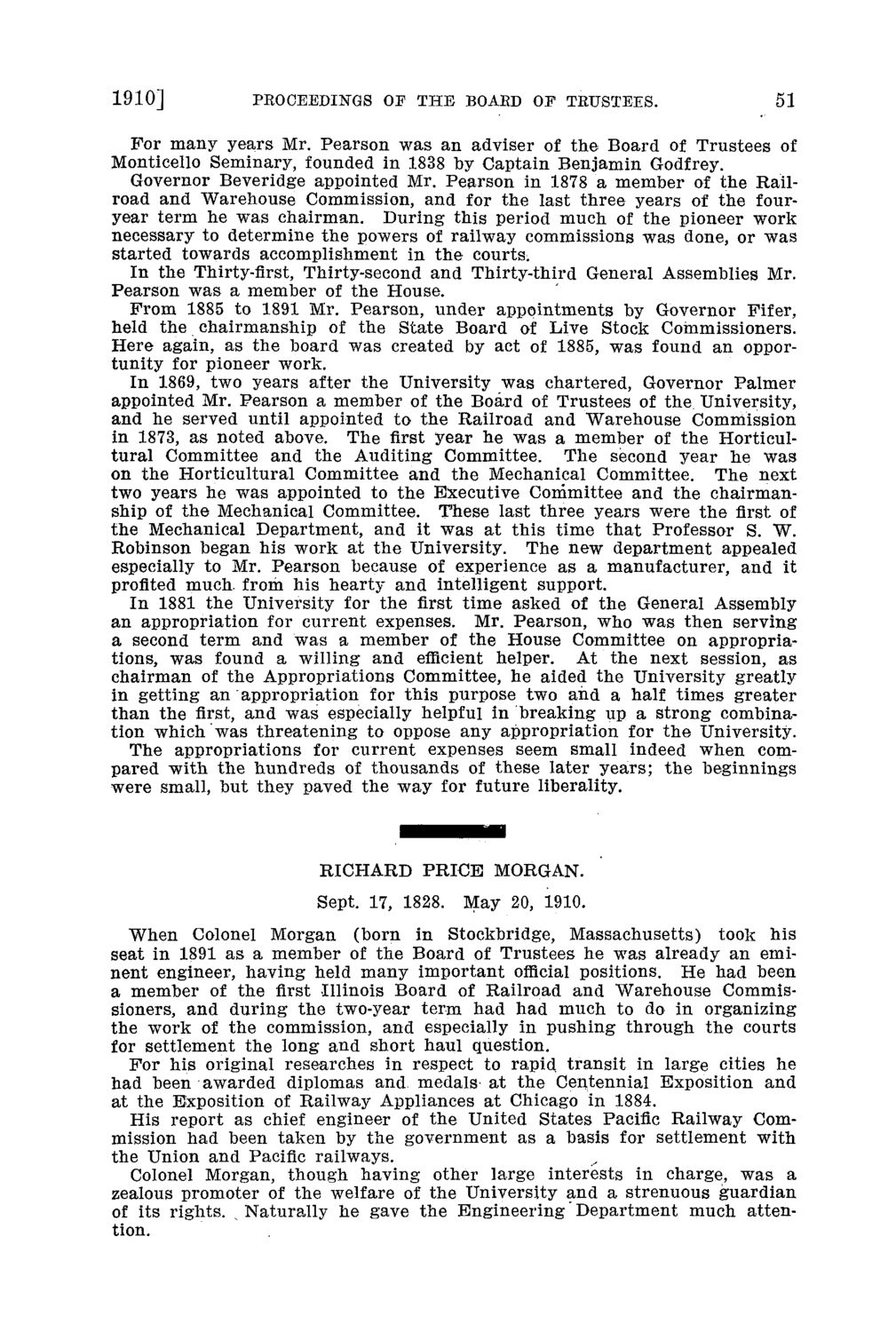| |
| |
Caption: Board of Trustees Minutes - 1912
This is a reduced-resolution page image for fast online browsing.

EXTRACTED TEXT FROM PAGE:
1910] PROCEEDINGS OP THE BOARD OF TRUSTEES. 51 For many years Mr. Pearson was an adviser of the Board of Trustees of Monticello Seminary, founded in 1838 by Captain Benjamin Godfrey. Governor Beveridge appointed Mr. Pearson in 1878 a member of the Railroad and Warehouse Commission, and for the last three years of the fouryear term he was chairman. During this period much of the pioneer work necessary to determine the powers of railway commissions was done, or was started towards accomplishment in the courts. In the Thirty-first, Thirty-second and Thirty-third General Assemblies Mr. Pearson was a member of the House. From 1885 to 1891 Mr. Pearson, under appointments by Governor Fifer, held the chairmanship of the State Board of Live Stock Commissioners. Here again, as the board was created by act of 1885, was found an opportunity for pioneer work. In 1869, two years after the University was chartered, Governor Palmer appointed Mr. Pearson a member of the Board of Trustees of the University, and he served until appointed to the Railroad and Warehouse Commission in 1873, as noted above. The first year he was a member of the Horticultural Committee and the Auditing Committee. The second year he was on the Horticultural Committee and the Mechanical Committee. The next two years he was appointed to the Executive Committee and the chairmanship of the Mechanical Committee. These last three years were the first of the Mechanical Department, and it was at this time that Professor S. W. Robinson began his work at the University. The new department appealed especially to Mr. Pearson because of experience as a manufacturer, and it profited much, from his hearty and intelligent support. In 1881 the University for the first time asked of the General Assembly an appropriation for current expenses. Mr. Pearson, who was then serving a second term and was a member of the House Committee on appropriations, was found a willing and efficient helper. At the next session, as chairman of the Appropriations Committee, he aided the University greatly in getting an appropriation for this purpose two and a half times greater than the first, and was especially helpful in breaking up a strong combination which was threatening to oppose any appropriation for the University. The appropriations for current expenses seem small indeed when compared with the hundreds of thousands of these later years; the beginnings were small, but they paved the way for future liberality. RICHARD PRICE MORGAN. Sept. 17, 1828. May 20, 1910. When Colonel Morgan (born in Stockbridge, Massachusetts) took his seat in 1891 as a member of the Board of Trustees he was already an eminent engineer, having held many important official positions. He had been a member of the first Illinois Board of Railroad and Warehouse Commissioners, and during the two-year term had had much to do in organizing the work of the commission, and especially in pushing through the courts for settlement the long and short haul question. For his original researches in respect to rapid transit in large cities he had been awarded diplomas and. medals- at the Centennial Exposition and at the Exposition of Railway Appliances at Chicago in 1884. His report as chief engineer of the United States Pacific Railway Commission had been taken by the government as a basis for settlement with the Union and Pacific railways. Colonel Morgan, though having other large interests in charge, was a zealous promoter of the welfare of the University and a strenuous guardian of its rights. s Naturally he gave the Engineering' Department much attention.
| |